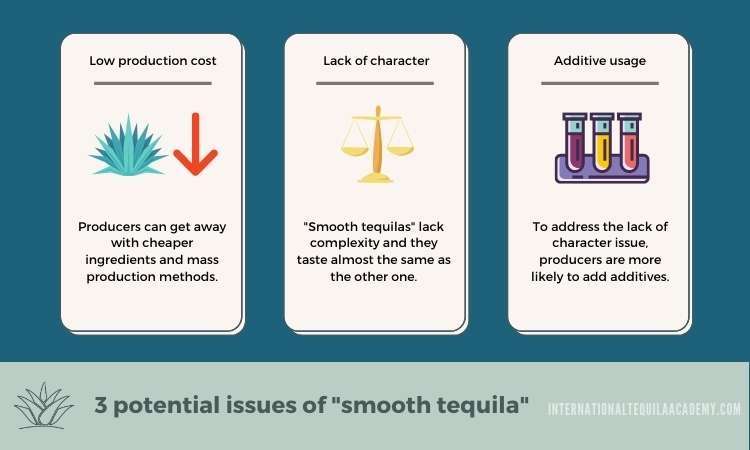First of all let’s make something very clear:
People who use the term “smooth tequila” alone without any additional context typically as a “quality distinction”, they just don’t know what they are talking about.
The reason being is that some of the most respected tequila producers in the world don’t want to produce a smooth tequila. They want “character”. They want their tequila to be different and to be easily identifiable by its rich aromas.
There are 3 important issues you should know about “smooth tequila”:
- Sign of lower production cost – you are likely being overcharged
- Lack character and uniqueness – your tequila lacks real value
- High possibility of additive usage – your health should matter more

Now before we get into it, just to further establish – people may differ on the actual interpretation of smoothness. We are talking specifically about Novice Drinkers using the word to describe “quality” tequilas or use it as a “quality” statement.
Sign of lower production cost
First of all, let me make this clear. “Smooth” tequilas are not traditionally made tequilas. Traditional producers want character and with it they can reinforce authenticity. With a “smooth” tequila it is almost impossible to tell how it was made. Exactly this is why it is safe to assume a lower production cost as it would not make sense to create a high cost tequila and then remove the only evidence of its higher value – its natural unique taste and complexity. Unfortunately we don’t have access to appropriate production information like in the case of a Scotch whisky*. However if you go to a store, buy some of the cheapest Scotch whiskies in the range of 10 dollars, you will notice how “smooth” or light they are. So this is really not a rocket science. If you want “smooth” tequila, you will likely get a mass produced (diffuser) “cheap make”. No problem with this, just make sure you understand that businesses can go cheap with ingredients and processes without you ever realizing this. The question is: why would you pay more for something that costs less to produce?
* Tequila producers can freely blend their tequilas with other producers’ tequila without disclosing this – Scotch producers have to disclose this information: “single” meaning single distillery and “blended” meaning a blend of at least two distilleries
Lack of character and uniqueness
Let’s assume for a second that production cost does not count for determining the value of a tequila. If so, the other most important element for evaluation is the uniqueness. So how unique can smooth tequilas be? To make your tequila “smooth”, a producer would need to apply a combination of the following processes: oxygenation, heavy filtration, adding additives. These are all processes that are great for hiding or correcting production issues. But then, just much is the real value of a tequila that’s natural taste has been altered or masked?
Additive usage
Not many drinkers know, but for example wine has over 50 allowed additives according to EU legislation. And even a spirit like vodka that is considered to be a pure mix of ethanol and water has additives in them so that they don’t all taste the same. This is something that can be observed in the tequila world too, here you can find our detailed article about the different additives producers can add into tequila. Tequila can have several undisclosed additives in all classifications – and these additives can work “wonders” even in tiny amounts. While we will never have an actual proof of this and brands are unlikely to disclose their additive strategy, consumers beware there may be a lot of additives in your tequila even without you knowing it. The first additives (abocados) were literally introduced so that producers can create “smooth” tequilas in an easier way.
You should pay less for “smooth” & try some traditional tequilas.
The biggest problem is that many of these “smooth” tequilas also belong to two very misleading marketing terms – “premium” and “top shelf”. This is why Novice drinkers consider “smooth” as a quality trait. They assume that a “smooth tequila” that costs several hundred dollars has to be great. Unfortunately they simply fall into the trap of just not knowing the real value of a tequila and producers can take advantage of this.
If you like “smooth” tequilas, no worries at all – we all have different taste buds. However – if you follow my train of thought – paying a lot of money for them may not be a wise investment of your hard earned money.
I do encourage you to try some tequilas made with love and passion. You will get more value for your money and you get to support an independent, local producer with your purchase. Traditional tequila and mezcal was never meant to be smooth, so you will get a piece of culture and tradition as well with your purchase. And in the end if you don’t like them, you can always go back to drinking “smooth” tequilas.

